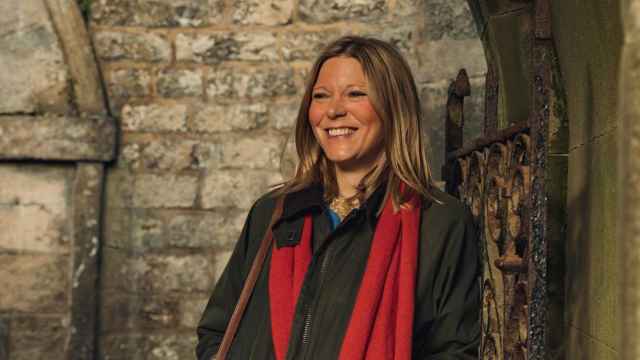World-renowned Russian opera diva Galina Vishnevskaya, who with her husband defied the Soviet regime to give shelter to writer Alexander Solzhenitsyn and suffered exile from her homeland, has died at 86. Moscow's Opera Center, which Vishnevskaya created, said the singer, celebrated internationally for her rich soprano voice, died Tuesday in the Russian capital. It didn't give the cause.
Vishnevskaya took to the local stage for the first time at the late age of 18 but went on to enchant audiences as one of the lead soloists at Moscow's prestigious Bolshoi theater. By the 1960s she had become an international opera sensation, filling the world's greatest theaters.
Her talents were so mesmerizing that British composer Britten wrote the soprano part of his "War Requiem" especially for her, and Russian composer Dmitri Shostakovich chose her for a renowned rendition of his opera "Lady Macbeth of Mtsensk."
Vishnevskaya and the cellist Mstislav Rostropovich married in 1955, frequently performed together and used their star status in the Soviet Union to help friends in trouble. In the most notable example of their defiance of the Communist authorities, they sheltered Solzhenitsyn at their country home for several years as he faced official reprisals.
"They hosted Solzhenitsyn at the moment when he had no place to live, even though they knew that the authorities will not pat them over their shoulder for doing that," said Lyudmila Alexeyeva, a Soviet-era dissident who heads the respected Moscow Helsinki Group rights watchdog, according to the Interfax news agency.
After Solzhenitsyn was expelled from the country, Vishnevskaya and Rostropovich left the Soviet Union with their two daughters in 1974. They lived in Paris and then Washington, and were stripped of their Soviet citizenship in 1978.
They returned to Russia after the Soviet collapse and became involved in public activities and charitable work. Rostropovich, who was Vishnevskaya's third husband, died in 2007.
Former Soviet President Mikhail Gorbachev, who restored Soviet citizenship for Vishnevskaya and Rostropovich in 1990, praised them for their eagerness to help others. "They were people who not only excelled in art, but came to help those who needed it," Gorbachev was quoted by Interfax as saying.
Vishnevskaya was born in Leningrad in 1926. Her parents separated when she was 5 and she was raised by her grandmother. She remained in the city during the Nazi siege and served as a volunteer helping to defend the city from Luftwaffe bombings.
Vishnevskaya joined Moscow's Bolshoi Theater in 1952, making her debut as Tatiana in "Yevgeny Onegin" the following year. She remained its prima for more than two decades, performing dozens of soprano roles in Russian and European opera classics.
The late Boris Pokrovsky, who directed her at the Bolshoi, once praised Vishnevskaya's "extraordinary musical and vocal abilities, theatrical charm, hot temperament, natural feeling of the stage, and bold outspokenness."
Dmitri Shostakovich, a neighbor and a close friend, wrote two song cycles and an orchestration of Mussorgsky's "Songs and Dances of Death" for her. Benjamin Britten wanted her to be part of the premiere of his "War Requiem" in 1962, but the authorities prevented her from leaving the Soviet Union.
She made her Metropolitan Opera debut as Aida in 1961 and first sang Liu in Turandot in La Scala in 1964. In 1966, she won the coveted title of the People's Artist of the U.S.S.R.
Vishnevskaya opened her own opera center in Moscow in 2002, which has since trained a number of international stars. She remained artistic director until her death.
Another legendary Russian diva, Yelena Obraztsova, hailed Vishnevskaya as a perfectionist. "Everything she did, she did well," Obraztsova said, according to RIA-Novosti news agency. "She was very demanding to herself, not just others."
Vishnevskaya, who is survived by her two daughters, will be buried Friday at Moscow's Novodevichy Cemetery alongside her husband. (AP, Reuters)
A Message from The Moscow Times:
Dear readers,
We are facing unprecedented challenges. Russia's Prosecutor General's Office has designated The Moscow Times as an "undesirable" organization, criminalizing our work and putting our staff at risk of prosecution. This follows our earlier unjust labeling as a "foreign agent."
These actions are direct attempts to silence independent journalism in Russia. The authorities claim our work "discredits the decisions of the Russian leadership." We see things differently: we strive to provide accurate, unbiased reporting on Russia.
We, the journalists of The Moscow Times, refuse to be silenced. But to continue our work, we need your help.
Your support, no matter how small, makes a world of difference. If you can, please support us monthly starting from just $2. It's quick to set up, and every contribution makes a significant impact.
By supporting The Moscow Times, you're defending open, independent journalism in the face of repression. Thank you for standing with us.
Remind me later.






